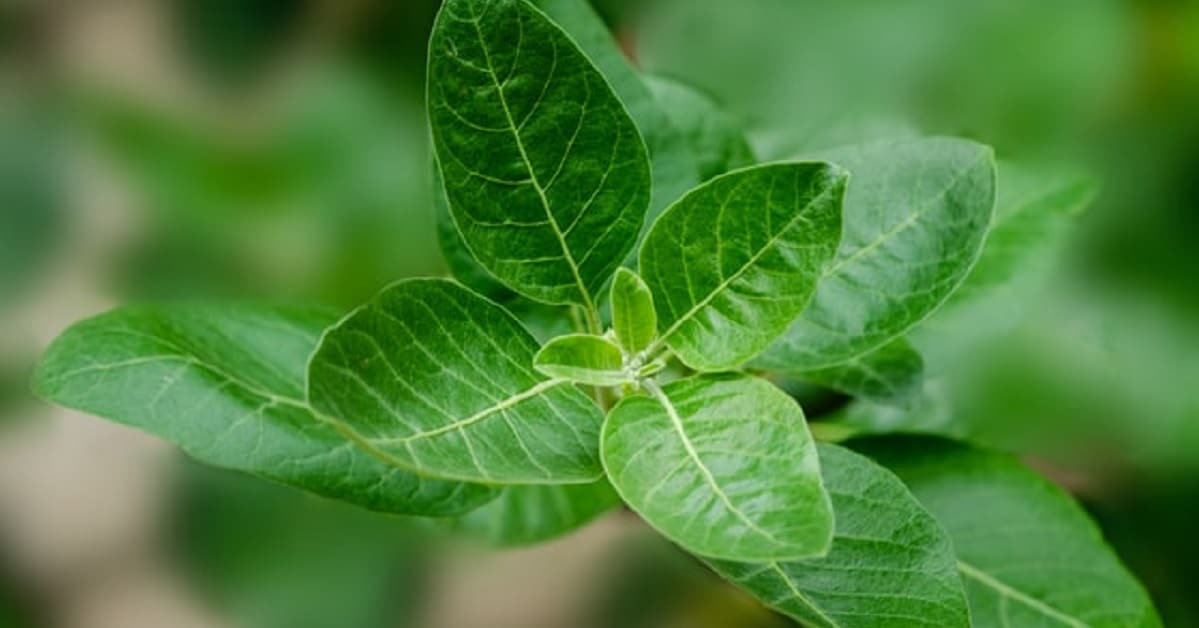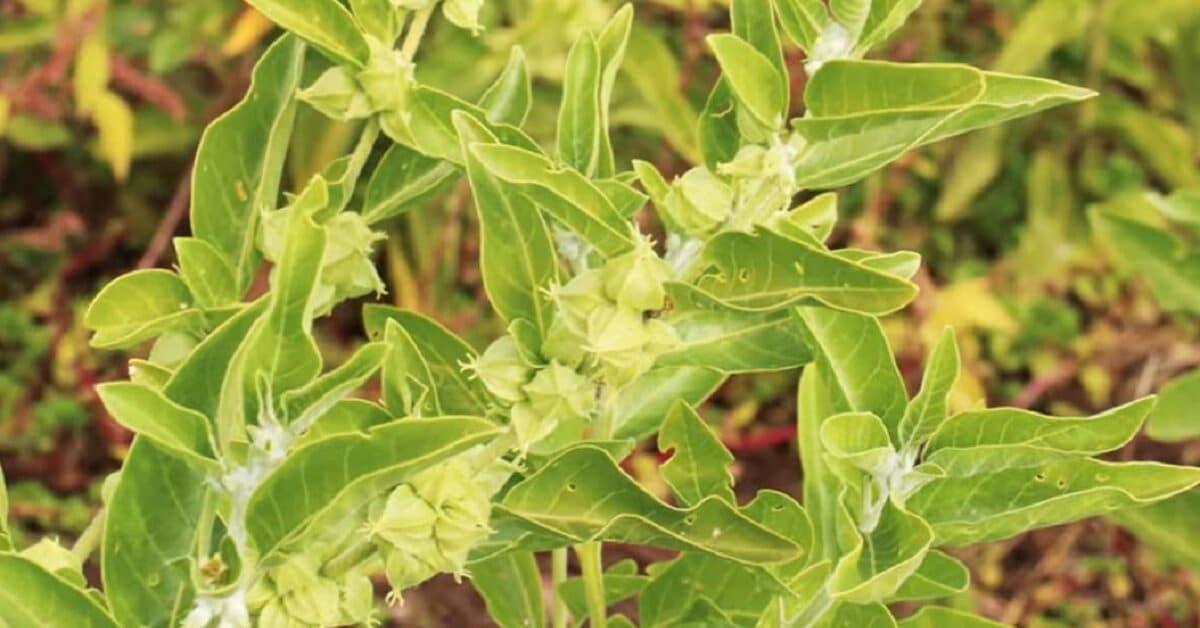
This article explores the subject of ashwagandha benefits for women based on available evidence from scientific research studies.
Ashwagandha (Withania somnifera) is a shrub that belongs to the Solanaceae or nightshades family of flowering plants. It is an ancient Ayurvedic medicinal herb believed to have many health benefits for women. Ashwagandha means “horse smell” in ancient Sanskrit. It is known as Amukkara and Kaknaje Hindi in India; poison gooseberry, Indian ginseng, or winter cherry in English-speaking countries.
Withania somnifera grows wild in dry, warm, or hot climates of some Mediterranean countries, India, the Middle East, and North Africa. The plant’s root and leaf extracts are used for medicinal purposes. The extracts have reportedly been used in the Indian Ayurvedic culture as an adaptogen for more than 3,000 years.
An adaptogen is a herb that helps reduce stress, boost energy, immunity, strength, stamina, libido, vigor, and improve mental focus and alertness.
The herb recently got a boost in popularity after multiple scientific studies appeared to support the ancient claims about its adaptogenic properties.
21 ashwagandha benefits for women you need to know

Modern women face many pressures at home and work that affect their physical and mental health. The demands of a fast-paced lifestyle have increased interest in health-promoting supplements that supply essential vitamins, such as cholecalciferol (vitamin D3) and cobalamin (vitamin B12), and minerals such as iron.
Women are also interested in adaptogenic herbs believed to fight stress and maintain youthful vigor.
Ashwagandha has been gaining attention lately due to scientific research-backed claims that it may have many health benefits for women. This article lists 21 potential ashwagandha health benefits for women based on evidence from recent scientific research.
1. Ashwagandha may have anti-aging and rejuvenating properties

One of the most hyped health benefits of ashwagandha for women is its claimed anti-aging properties. Many women want to know whether treatment with ashwagandha extracts will slow down or even reverse the effects of aging.
Sharma and Martins reported that ashwagandha is one of several Ayurvedic medicinal herbs known collectively as Rasayana (health tonics). According to Ayurvedic tradition, ashwagandha and other Rasayanas protect against stress and promote health, immunity, vigor, and vitality. Ayurvedic tradition ascribes anti-aging properties to ashwagandha. It is supposed to promote longevity by slowing down degenerative changes.
According to Sharma and Martins, studies suggest ashwagandha may indeed have anti-aging properties. The researchers cited a 2013 study by Kumar et al. that found that ashwagandha’s phytochemical constituents known as withanolides (also known as C28-steroidal lactone triterpenoids) extended the mean life span of the nematode Caenorhabditis elegans by 29.7%.
The authors also cited a study by Raguraman et al. that concluded that the plant’s root extract enhanced telomerase activity in human HeLa cell lines by about 45%.
Telomerase is the enzyme responsible for maintaining telomeres, the part of the chromosome believed to be the key to aging.
2. May help in the management of perimenopause and menopausal syndrome
Medical research studies suggest that ashwagandha extract may help in the management of menopausal syndrome.
Modi et al. concluded that women with mild to moderate symptoms of menopausal syndrome treated with a combination of Ayurvedic herbs, including ashwagandha, reported an improvement in somatic and psychological symptoms.
Another team of researchers found that the plant’s root extract relieved mild to moderate symptoms of perimenopause in women (Gopal et al.).
3. Withania somnifera may improve sexual function in women

Sexual dysfunction is a common condition among women. It may be due to organic disease, anxiety, feelings of guilt, fear, and stress.
A study found that ashwagandha root extract was effective and safe for improving sexual function in healthy females (Dongre et al.). The researchers concluded that oral administration of the root extract improved the symptoms of female sexual dysfunction (FSD). They suggested that it alleviated FSD in women by reducing stress and increasing testosterone.
The authors noted that while their data showed that W. somnifera improved multiple indices of sexual function, such as lubrication, distress, pain, orgasm, and satisfaction, it did not improve “sexual desire.”
They therefore cautioned against interpreting their study to mean that ashwagandha can be used as an “aphrodisiac.”
4. Ashwagandha may treat infertility in women
Treatment with ashwagandha extract improved reproductive fertility in women, according to researchers.
Azgomi et al. reported that Withania somnifera (WS) improved fertility in women and promoted the healthy functioning of the female reproductive system in many ways. It improved luteinizing hormone (LH) and follicle-stimulating hormone (FSH) balance, and promoted folliculogenesis.
The authors noted that although the mechanisms through which ashwagandha improved the health and function of the reproductive system were not well understood, it may be due to the antioxidative properties of withanolide components, such as withanolide A, withaferin A (WFA), and withanolide D.
They also reported that WS extract has GABA mimetic properties and that it may play a role in inducing gonadotropin-releasing hormone (GSH) secretion.
5. Ashwagandha may lower prolactin levels
Research suggests that Withania somnifera may lower prolactin levels (Agzomi et al.).
The study by Agzomi et al. focussed on the ability of the root and leaf extracts to improve male fertility by lowering prolactin levels. However, ashwagandha’s ability to improve female fertility may be partly due to lowering prolactin levels in non-pregnant and non-nursing women.
Prolactin is a hormone produced by the pituitary gland. It promotes the growth of mammary glands (breasts) and stimulates lactation after birth in female mammals.
Prolactin levels increase during pregnancy and after birth, but it is much lower in non-pregnant women. It is also low in men.
Higher-than-normal prolactin levels in non-pregnant women and men may be associated with a type of benign (non-cancerous) pituitary gland tumor known as prolactinomas.
Excessive levels of the hormone in non-pregnant women who have not gone through menopause can cause reproductive problems, such as menstrual cycle issues and infertility.
High prolactin levels may cause irregular periods, premature menopause, and the cessation of periods before the age of 40.
6. Ashwagandha may protect against cancer

Ashwagandha may have anti-cancer properties. Studies suggest it may help prevent cancers that affect women.
Dutta et al. reported that withaferin-A (WFA), one of the active withanolide components of the herb’s root and leaf extracts, has been shown to have significant cytotoxic activity. WFA’s cytotoxic activity suggests it could be used to treat many types of cancer, including breast cancer.
The studies found that withaferin-A impeded the growth of new cancer cells, but did not impede the growth of normal cells. Withaferin-A also helped induce programmed death of cells (apoptosis) by generating reactive oxygen species (ROS).
Withaferin-A has inhibitory activity against leukemia, breast cancer, and colon cancer cells, Choi et al. reported.
The researchers found that WFA has an inhibitory effect on the proliferation and migration of human colorectal cancer (HCT116) cells. They concluded that their study suggested that withaferin-A could play a role in the treatment of human colorectal cancer.
Another study reported that withaferin-A prevented the development of cancers of various types (Lee and Choi). It suppressed carcinogenesis through its anti-oxidative, anti-inflammatory, anti-proliferative, and apoptosis-inducing properties, the authors reported.
7. W. somnifera may reduce stress by lowering cortisol levels in women

Physical, mental, and emotional stress have been associated with many medical conditions in women, including high blood pressure, cardiovascular diseases, peptic ulcers, lowered immunity, menstrual cycle problems, infertility, mental health problems, and obesity.
One study found that ashwagandha root extract significantly reduced serum levels of the stress hormone cortisol in subjects with a history of chronic stress (Chandrasekhar et al.). The researchers concluded that supplementation with high-concentration root extract may improve people’s ability to cope with stress.
Supplementation may also improve the physiological, cognitive, and psychological effects of stress, according to Remenapp et al.
8. May help in weight management
Several studies suggest ashwagandha root extracts could play a role in body weight management, alongside healthy diets high in fiber, low in carbs, and containing adequate high quality protein.
Choudhary et al. reported that the plant’s root extract was safe and tolerable for most healthy subjects and may play a role in body weight management in women under chronic stress.
The authors noted that chronic stress was associated with many illnesses and conditions, including obesity (stress-induced obesity).
9. May reduce anxiety symptoms in women
Many women suffer from anxiety and other anxiety conditions, such as generalized anxiety disorder (GAD) and social anxiety disorder (SAD).
Multiple studies suggested that W. somnifera may reduce anxiety symptoms (Pratte et al.). However, the researchers warned that the evidence from multiple studies should be received with caution due to potential methodological problems.
A study reported that ashwagandha may have anxiolytic properties and that its anxiety-relieving effect could be due to its ability to regulate the hypothalamus, pituitary, and adrenal glands (Lopresti et al.).
Another study by Salve et al. concluded that it reduced anxiety and stress, and improved sleep quality.
The dry leaf powder may have anxiolytic properties and alleviate the neuroinflammatory effects of high fat diet-induced obesity, according to Kaur and Kaur.
10. May alleviate the symptoms of depression

A study by Gannon et al. concluded that ashwagandha holds promise in the management of depression and anxiety symptoms in patients with schizophrenia. The researchers added that more studies were needed to explain the mechanisms of the clinical efficacy they observed.
Ashwagandha has antidepressant and anxiolytic activity (Bhattacharya et al.). Bioactive glycowithanolides (WSG) isolated from ashwagandha root and the anxiolytic benzodiazepine drug lorazepam both reduced brain levels of tribulin, a marker of clinical anxiety, the researchers reported.
They concluded that WSG had an antidepressant effect and that it could play a role as a mood stabilizer in clinical depression and anxiety.
Azgomi et al. reported that ashwagandha has GABA-mimetic properties.
11. W. somnifera may treat hair loss due to congenital adrenal hyperplasia
Ashwagandha was effective in a case of nonclassic congenital adrenal hyperplasia characterized by hair loss.
Congenital adrenal hyperplasia (CAH) refers to several related types of inherited disorders that cause impaired production of enzymes involved in the biosynthesis of adrenal gland hormones (cortisol, aldosterone, and androgen).
Kalani et al. reported that doctors treated a 57-year-old woman who experienced excessive hair loss, intermittent burning sensation in the scalp, and excessive scalp dryness due to non-classical adrenal hyperplasia.
Her scalp and hair condition improved after six months of treatment with Withania somnifera (WS) extracts.
12. May have neuroprotective benefits for women
Ashwagandha may have neuroprotective properties and protect the brain from several disorders (Zahiruddin et al.)
The authors reported that Withania somnifera has many neuroprotective phytoconstituents, including sitoindosides VII-X, withaferin A, withanosides IV, withanols, withanolide A, withanolide B, anaferine, beta-sitosterol, and withanolide D.
The neuroprotective phytoconstituents have pharmacological effects in many brain-associated disorders, such as Parkinson’s, Alzheimer’s, schizophrenia, attention deficit hyperactivity disorder (ADHD), bipolar disorders, Huntington’s disease, dyslexia, autism, addiction, and amyotrophic lateral sclerosis.
Wongtrakul et al. also reported that the root extract has neuroprotective properties and may play a role in preventing neurodegenerative diseases.
13. May improve memory and cognitive function

Ashwagandha may also promote cognitive function and memory, in addition to its potential neuroprotective roles.
W. somnifera alleviated cognitive impairment induced in mice by the endocrine disruptor Bisphenol A (BPA), a toxic industrial substance used in the manufacture of polycarbonate plastics and epoxy resins (Birla et al.).
W. somnifera may help enhance memory in people with mild cognitive impairment (MCI), improve executive function, sharpen mental focus, and boost the brain’s processing speed (Choudhary et al.)
The plant’s extracts are safe and well-tolerated by healthy adults (Gopukumar et al.). Treatment with ashwagandha for 90 days significantly reduced stress, improved memory, focus, sleep quality, and feelings of psychological well-being in people experiencing high levels of stress.
14. May help in treating psychiatric disorders
Research evidence suggests that ashwagandha may help in the management of mental health and psychiatric disorders, such as schizophrenia.
A study by Chengappa et al. found that extract of Withania somnifera (WS) improved psychopathology and symptoms of stress in patients with schizophrenia and schizoaffective disorder.
The researchers concluded that the adjunctive treatment of patients with extract of W. somnifera helped reduce symptoms of stress and schizophrenic disorder. They also reported that the extract was safe and had minimal side effects.
15. May reduce inflammation
Research studies indicate that ashwagandha reduces inflammation.
Multiple studies indicate that Withania somnifera could be effective in treating chronic inflammatory diseases (Logie et al.).
Withaferin-A (WA), one of the several bioactive compounds in ashwagandha, exerts anti-inflammatory effects by targeting multiple inflammatory signaling pathways, such as nuclear factor kappa B (NF-κB) and nuclear factor erythroid 2 related factor 2 (Nrf2).
WA suppresses inflammation in obesity, diabetes, cystic fibrosis, osteoarthritis, and neurodegenerative diseases, the researchers reported.
Hydroalcoholic extract of ashwagandha showed significant anti-inflammatory activity against denaturation of protein in vitro, Chandra et al. also reported.
16. Ashwagandha may boost immunity

Multiple studies reported that ashwagandha may boost immunity. It boosts the body’s defenses against diseases and infections by improving cell-mediated immunity (Singh et al.)
W. somnifera (WS) extract is also rich in antioxidants that protect cells against the damaging effects of oxidative stress.
Phytochemical extracts of WS that have potential antioxidant properties include alkaloids, flavonoids, steroidal lactones, saponins, and withanolides, such as withaferin-A, withanosides, sitoindosides, and beta-sitosterol.
A combination of ashwagandha extracts and Maitake mushroom-derived glucan (WB365) had multiple positive health effects, including boosting immunity and reducing stress (Vetvicka et al.).
In mice, WB365 promoted phagocytic activity and prevented an increase in stress-related corticosterone production. The authors emphasized that the stress alleviation activity of WB365 was important because stress is associated with lowered immunity.
Ziauddin et al. also reported that ashwagandha showed an immunostimulatory effect in female mice and increased hemoglobin concentration, red blood cell count, white blood cell count, and platelet count.
17. May lower blood sugar

W. somnifera may help control blood sugar levels in prediabetics and diabetics, multiple studies suggest.
A study found that root and leaf extracts had antidiabetic and antihyperlipidaemic activities in diabetic rats (Udayakumar et al.). The researchers recommended more studies to identify the constituents of the roots and leaves of the herb involved in the observed antidiabetic and antihyperlipidaemic effects.
Another team of researchers concluded that Withania somnifera lowered blood glucose levels and can play a role in managing diabetes mellitus (Durg et al.). But they cautioned that the evidence was not enough to recommend ashwagandha for treating diabetes and that more research was needed.
Gorelick et al. suggested that the active constituent of the plant that had antidiabetic properties was withaferin-A.
18. May lower cholesterol and triglycerides levels
Withania somnifera significantly reduced total and LDL-cholesterol in healthy individuals during a trial to evaluate the tolerability, safety, and activity of the extracts (Raut et al.).
Visavadiya et al. concluded that the herb’s root powder had hypocholesterolemic and antioxidant effects in hypercholesteremic albino rats. When the animals consumed a diet with WS root powder added, they showed significant decreases in lipids, cholesterol, and triglycerides, but significant increases in plasma levels of “good” HDL-cholesterol levels.
They also found that the root powder appeared to improve the lipid profiles of normal subjects.
19. Improved athletic performance, muscle mass, and strength in women
Multiple studies reported that ashwagandha improved athletic performance by improving muscle mass and strength.
Ashwagandha extract improved muscle mass and strength in healthy young males engaged in resistance training (Wankhede et al.). The researchers concluded that supplementation may improve results in bodybuilding and strength-training programs.
Supplementation was effective for improving physical performance-related variables in both healthy male and female subjects (Bonilla et al.).
Ziegenfuss et al. reported that a 500 mg dose of an aqueous extract of ashwagandha boosted upper and lower-body strength in individuals engaged in resistance training. It also improved body mass distribution in the subjects.
The extract improved athletic performance by alleviating generalized weakness, improving limb strength and coordination (Sandhu et al.).
20. W. somnifera may have analgesic properties and protect against joint pains
Ashwagandha may be effective for treating joint pains, according to a recent study.
Root extracts contain withanolide glycosides that have analgesic, anti-inflammatory, and chondroprotective properties (Ramakanth et al.)
A substance is said to be chondroprotective when it promotes joint health and protects against the degenerative features of arthritis, including joint space narrowing.
The researchers reported that an aqueous extract of ashwagandha root high in withanolide glycosides significantly reduced knee joint pain and discomfort in sixty patients.
A note to our readers
Although the potential health benefits of ashwagandha described in this article are based on peer-reviewed studies, we list them only for informational purposes and not as a substitute for advice and care by qualified healthcare providers.
More research still needs to be done to assess the potentials of ashwagandha for medicinal purposes. Therefore, this article does not recommend or prescribe ashwagandha for treating any medical condition.
Many of the conditions mentioned in this article, such as anxiety, stress, diabetes, heart disease, congenital adrenal hyperplasia, cancer, and COVID-19 are serious medical conditions. So, we strongly advise that you talk to your doctor first if you plan to use ashwagandha or any other herbal preparation for the purpose of supplementation, adjunctive therapy, or treatment of an ailment.
Only a doctor can diagnose your illness and prescribe appropriate treatment.

